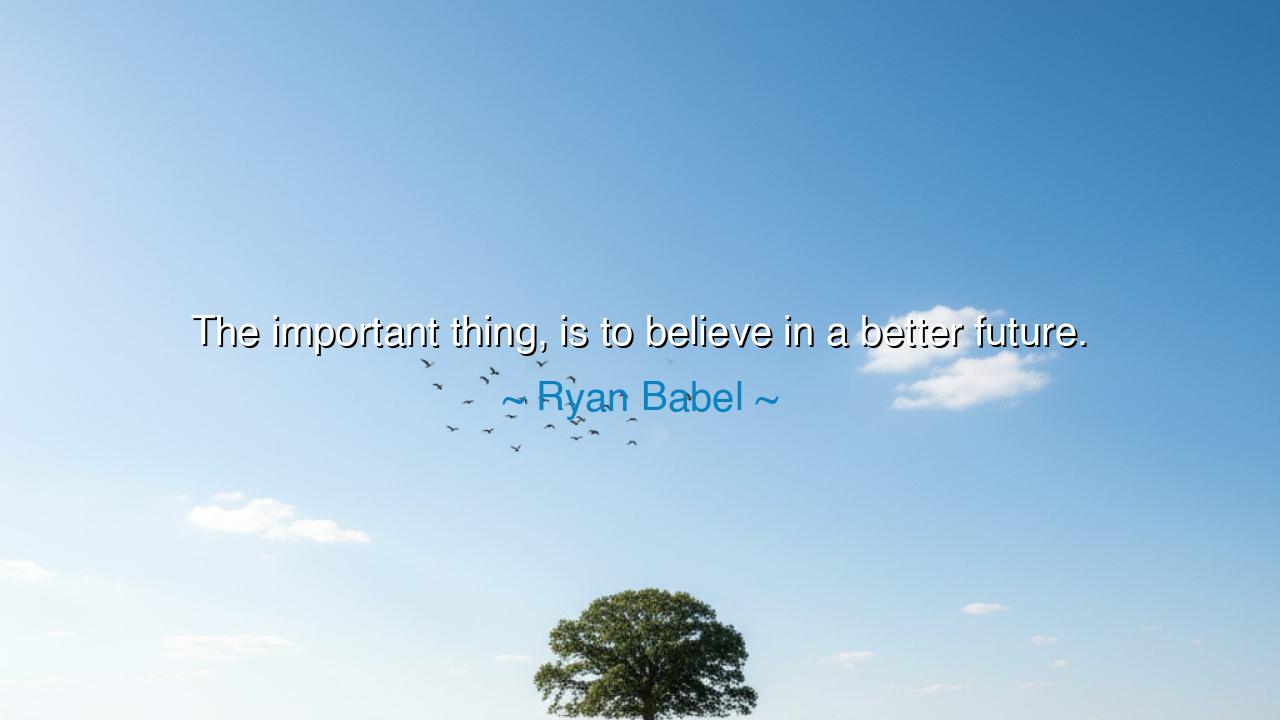
The important thing, is to believe in a better future.






In the ancient stories passed down through generations, there is a common thread that binds the tales of heroes, visionaries, and great leaders: the belief in a better future. Ryan Babel’s simple yet profound words, “The important thing, is to believe in a better future,” capture a timeless truth that has resonated through the ages. In times of strife, uncertainty, or darkness, the true strength of individuals and communities lies in their capacity to hope and believe that a better tomorrow is possible. This belief is not just about wishful thinking; it is the foundation upon which action is built, and it propels humanity toward progress, growth, and transformation.
The ancient Greeks understood the importance of hope in shaping the future. The word “elpis” in Greek refers not only to hope but to a desire for the future—a belief that things could be better, a conviction that the future holds promise. Homer in his Iliad and Odyssey frequently highlighted the role of hope as a driving force, propelling the heroes through their trials and tribulations. For Odysseus, hope was not just a feeling but a guide, helping him to persevere through seemingly insurmountable obstacles. Just as Odysseus believed in the possibility of returning home, we must believe in the possibility of a brighter future, for it is this belief that sustains us through hardship.
The great philosophers of antiquity, such as Socrates and Plato, also emphasized the importance of looking toward a better future as a means of shaping a just society. For Plato, the ideal city-state was one that sought wisdom, justice, and truth—an endeavor that required each citizen to believe in a better world and work together to bring it about. Plato’s Republic is not just a political treatise but a call to action—a reminder that the foundation of any great civilization is the hope for a better tomorrow and the collective will to shape it.
Nelson Mandela, one of the most iconic leaders of the 20th century, understood this idea deeply. Imprisoned for 27 years, he could have easily succumbed to despair. Yet, it was his belief in a better future for South Africa that sustained him through those long years of suffering. He believed that freedom and equality could prevail, even in the face of oppression. His belief was not passive; it fueled his actions, inspiring millions to continue the fight for justice and peace. Just as Mandela’s vision of a free and equal South Africa changed the course of history, so too does our belief in the future shape the path of our lives and the lives of those around us.
Babel’s quote echoes this sentiment. To believe in a better future is not to ignore the hardships or sufferings of today, but to hold onto the belief that change is possible, that tomorrow can be better than today. It is the vision of a better world that gives us the strength to move forward, even when the path is unclear. This belief is not a passive hope but an active force that compels us to take action and make choices that shape the world in ways that reflect our deepest values and desires.
In our own lives, the lesson is clear: the future is not something that simply happens to us; it is something we must actively create. To believe in a better future means to take responsibility for the world we are building. It calls us to imagine a world that reflects justice, compassion, and wisdom, and then to take steps—no matter how small—to bring that world into being. Whether in our personal lives, our communities, or on the larger global stage, our actions today are the seeds of the future we will live in.
As we move forward, we must embrace the belief that change is not only possible, but necessary. Just as the great figures of history, from the philosophers of ancient Greece to the leaders of the civil rights movements, have shown us, the belief in a better future is a mighty force—a force that shapes not only our individual lives but the world as a whole. Let us be guided by this belief, not as passive dreamers, but as active creators of a future that embodies the values we hold dear. For in our faith and action, we can shape a world that reflects our highest aspirations.






AAdministratorAdministrator
Welcome, honored guests. Please leave a comment, we will respond soon